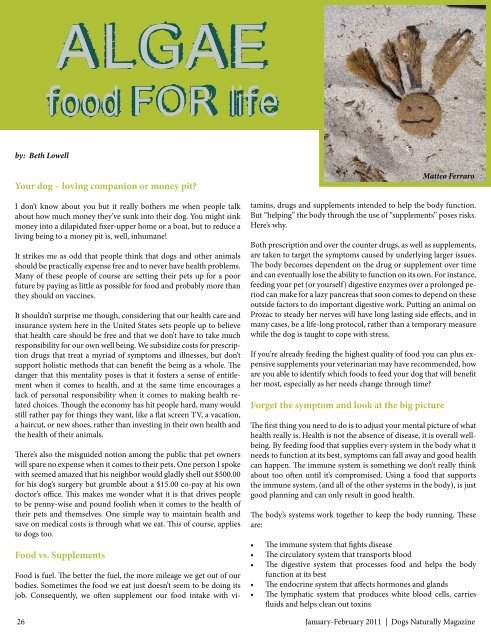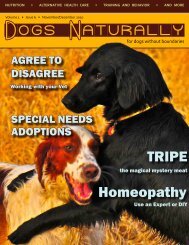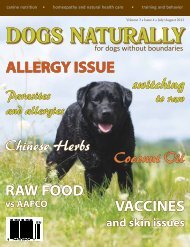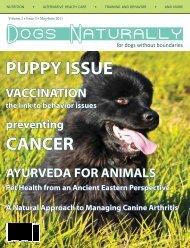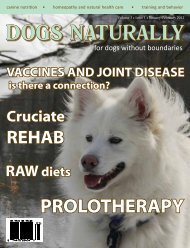January/February 2011 - Dogs Naturally Magazine
January/February 2011 - Dogs Naturally Magazine
January/February 2011 - Dogs Naturally Magazine
Create successful ePaper yourself
Turn your PDF publications into a flip-book with our unique Google optimized e-Paper software.
y: Beth Lowell<br />
ALGAE<br />
food FOR life<br />
Your dog – loving companion or money pit?<br />
I don’t know about you but it really bothers me when people talk<br />
about how much money they’ve sunk into their dog. You might sink<br />
money into a dilapidated fixer-upper home or a boat, but to reduce a<br />
living being to a money pit is, well, inhumane!<br />
It strikes me as odd that people think that dogs and other animals<br />
should be practically expense free and to never have health problems.<br />
Many of these people of course are setting their pets up for a poor<br />
future by paying as little as possible for food and probably more than<br />
they should on vaccines.<br />
It shouldn’t surprise me though, considering that our health care and<br />
insurance system here in the United States sets people up to believe<br />
that health care should be free and that we don’t have to take much<br />
responsibility for our own well being. We subsidize costs for prescription<br />
drugs that treat a myriad of symptoms and illnesses, but don’t<br />
support holistic methods that can benefit the being as a whole. The<br />
danger that this mentality poses is that it fosters a sense of entitlement<br />
when it comes to health, and at the same time encourages a<br />
lack of personal responsibility when it comes to making health related<br />
choices. Though the economy has hit people hard, many would<br />
still rather pay for things they want, like a flat screen TV, a vacation,<br />
a haircut, or new shoes, rather than investing in their own health and<br />
the health of their animals.<br />
There’s also the misguided notion among the public that pet owners<br />
will spare no expense when it comes to their pets. One person I spoke<br />
with seemed amazed that his neighbor would gladly shell out $500.00<br />
for his dog’s surgery but grumble about a $15.00 co-pay at his own<br />
doctor’s office. This makes me wonder what it is that drives people<br />
to be penny-wise and pound foolish when it comes to the health of<br />
their pets and themselves. One simple way to maintain health and<br />
save on medical costs is through what we eat. This of course, applies<br />
to dogs too.<br />
Food vs. Supplements<br />
Food is fuel. The better the fuel, the more mileage we get out of our<br />
bodies. Sometimes the food we eat just doesn’t seem to be doing its<br />
job. Consequently, we often supplement our food intake with vi-<br />
tamins, drugs and supplements intended to help the body function.<br />
But “helping” the body through the use of “supplements” poses risks.<br />
Here’s why.<br />
Both prescription and over the counter drugs, as well as supplements,<br />
are taken to target the symptoms caused by underlying larger issues.<br />
The body becomes dependent on the drug or supplement over time<br />
and can eventually lose the ability to function on its own. For instance,<br />
feeding your pet (or yourself) digestive enzymes over a prolonged period<br />
can make for a lazy pancreas that soon comes to depend on these<br />
outside factors to do important digestive work. Putting an animal on<br />
Prozac to steady her nerves will have long lasting side effects, and in<br />
many cases, be a life-long protocol, rather than a temporary measure<br />
while the dog is taught to cope with stress.<br />
If you’re already feeding the highest quality of food you can plus expensive<br />
supplements your veterinarian may have recommended, how<br />
are you able to identify which foods to feed your dog that will benefit<br />
her most, especially as her needs change through time?<br />
Forget the symptom and look at the big picture<br />
Matteo Ferraro<br />
The first thing you need to do is to adjust your mental picture of what<br />
health really is. Health is not the absence of disease, it is overall wellbeing.<br />
By feeding food that supplies every system in the body what it<br />
needs to function at its best, symptoms can fall away and good health<br />
can happen. The immune system is something we don’t really think<br />
about too often until it’s compromised. Using a food that supports<br />
the immune system, (and all of the other systems in the body), is just<br />
good planning and can only result in good health.<br />
The body’s systems work together to keep the body running. These<br />
are:<br />
• The immune system that fights disease<br />
• The circulatory system that transports blood<br />
• The digestive system that processes food and helps the body<br />
function at its best<br />
• The endocrine system that affects hormones and glands<br />
• The lymphatic system that produces white blood cells, carries<br />
fluids and helps clean out toxins<br />
26 <strong>January</strong>-<strong>February</strong> <strong>2011</strong> | <strong>Dogs</strong> <strong>Naturally</strong> <strong>Magazine</strong>


